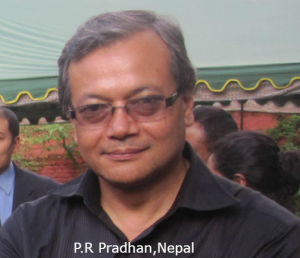-Pushpa Raj Pradhan
Chief Editor
The People’s Review Weekly, Nepal

Pushpakamal Dahal Prachanda has become the Prime Minister for the third time. We are not surprised to see him as the new prime minister as the post of the prime minister is being enjoyed by a few political leaders in cyclic order.
The general public is facing many problems including uncontrolled inflation in the market but instead of resolving the problems faced by the people, the leaders are again engaged in the “bhagbanda” politics or say getting a big portion of the cake for themselves, although, the partners have been changed.
The nation is facing serious economic problems. The foreign currency reserve is not satisfactory. The government revenue collection is less than the total general sector expenditure targeted by the government.
The money market is facing a liquidity crisis and the banks are attracting deposits by increasing interest rates on public savings. Nepal Rastra Bank had imposed a ban on imports of some luxury items but when the government failed to meet the customs revenue target, the ban has been lifted.
Again, the central bank has asked the government to control foreign currency provided for students going abroad for further studies.
The three governments – federal, provincial and local – are competing for imposing and increasing taxes on the general public. Poor Nepali people are compelled to pay above 35 per cent as tax to the different levels of government.
Besides, they are compelled to pay a high price for services provided by the government. The profit margin taken by the government on petroleum products is above 100 per cent. The government is collecting tax on different titles but whether it is spending the collected tax on the allotted sectors, the government has never informed the general public.
For example, the government is raising pollution tax, road tax and infrastructural development tax on petroleum products. Where the government spends the tax collected on these titles, we don’t know. The trend of shifting funds to other sectors is rampant in the Finance Ministry.
For years, the government is collecting additional tax on petroleum products for the construction of the Budhigandaki hydropower project. How much amount did the government collect for the said project and where did the government spend it, we are unaware.
We believe, such taxes collected from the consumers have been spent for the general sector expenses as we have such a huge political structure, the government needs huge money to function it.
The budget spent for the functioning of the political system is a non-productive expenditure. If it constructs a hydropower project, it will create employment opportunities and also it will start to pay revenue to the government after starts producing electricity.
But the expenditure made by the government for the salaries and allowances for the political representatives elected in the federal parliament, provincial councils and local bodies will neither create employment opportunities nor such expenditure will create revenue opportunities for the government. Besides, along with such elected people’s representatives’ assignments, additional expenditures for their secretaries, advisors and aides will have to be paid by the government.
The government should manage such expenditures either from tax or from domestic and foreign debts. In the past five years, the loan burden has doubled on the total debt amount that was five years back.
Although the debts have not crossed the limit, if the present trend of taking foreign debt will continue, shortly, the country may face a debt trap crisis. If the government revenue collection is below the general sector expenditure, the government should raise domestic and foreign debt to meet the general sector expenditure.

If a country can manage development sector expenditure from its own revenue sources, then only we can say the economic indicators are positive. It is okay to take domestic and foreign debt for development projects if evaluated the project based on a cost-benefit analysis.
When the government is unable to meet the general sector expenditure, we are seeing the practice of taking foreign debt for different projects by over-evaluating the project costs by many times. The project costs for the construction of the Gautam Buddha International Airport and also the Pokhara Regional Airport are many times higher than the estimated cost prepared by the experts.
The margin difference has gone to the pocket of the political leaders and others involved in these projects. This is an example of rampant corruption.
In conclusion, without scrapping the present political system and without punishing those corrupt political leaders and high-ranking bureaucrats, the nation cannot move towards the path of prosperity.
The general public is against the present political system and the rule of those corrupt leaders, unfortunately, they are not organized and unable to launch a revolt against the political leaders.
# Text courtesy: The People’s Review Weekly dated December 28, 2022: Ed. Upadhyaya.
